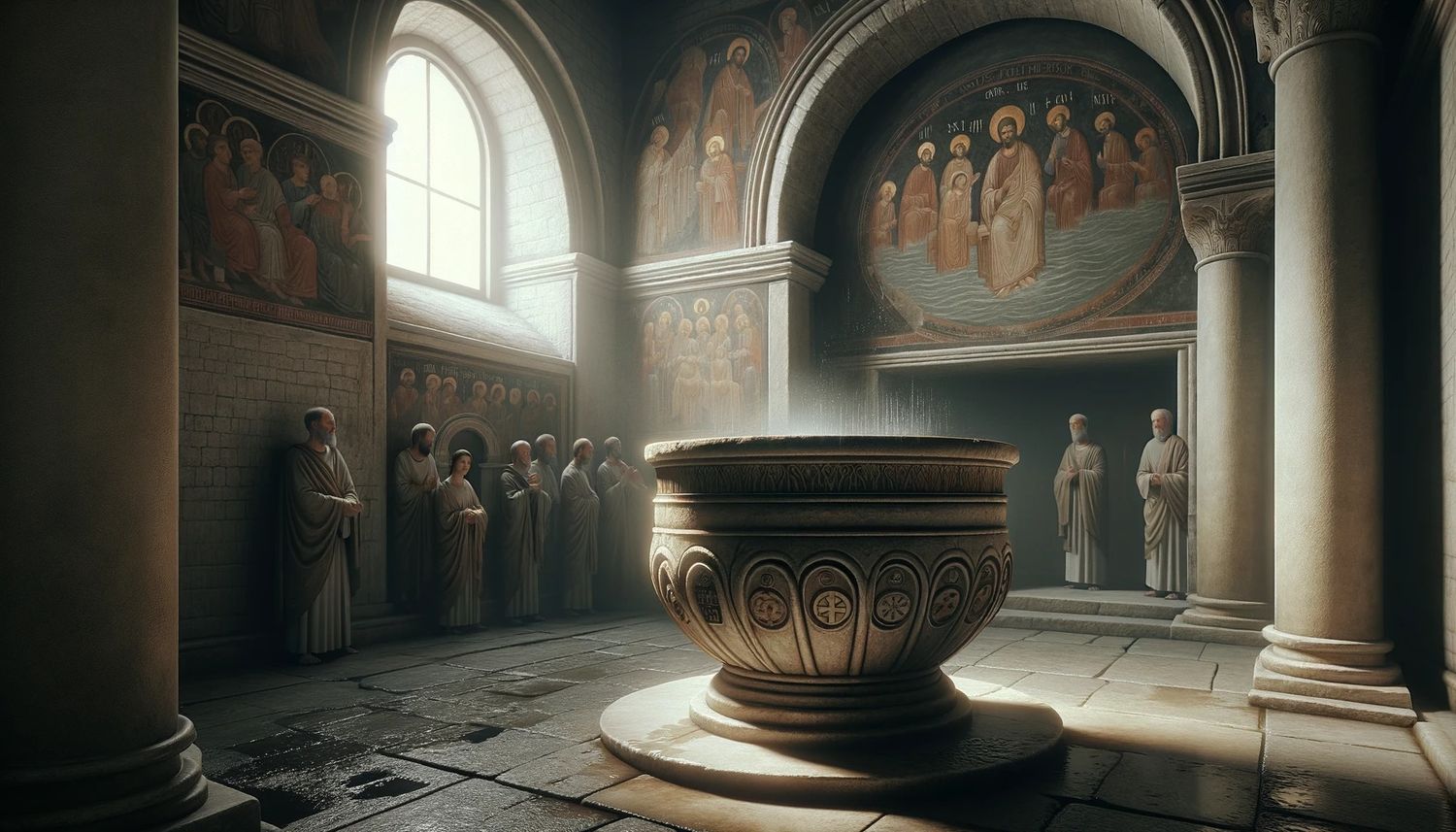Home>Theology and Spirituality>What Baptisms Does The Catholic Church Recognize?


Theology and Spirituality
What Baptisms Does The Catholic Church Recognize?
Published: February 28, 2024
Ericka Andersen, an editor at Christian.net, expertly merges digital strategy with content creation, focusing on faith and societal issues. Her communication skills enhance the platform's engaging narratives, fostering meaningful dialogue on belief's impact on society.
Discover the types of baptisms recognized by the Catholic Church and their significance in theology and spirituality. Explore the sacramental practices and beliefs.
(Many of the links in this article redirect to a specific reviewed product. Your purchase of these products through affiliate links helps to generate commission for Christian.net, at no extra cost. Learn more)
Table of Contents
Introduction
What Baptisms Does the Catholic Church Recognize?
The Catholic Church recognizes three forms of baptism: baptism of water, baptism of blood, and baptism of desire. Each form has its own significance and is recognized by the Church as a valid means of receiving the sacrament of baptism. In this article, we will explore each form of baptism and the conditions under which they are recognized by the Catholic Church. Whether it's the baptism of infants, adults, or through water, blood, or desire, the Catholic Church has specific guidelines for recognizing the validity of each form of baptism. Let's delve into the details of each type of baptism and understand the Church's stance on this essential sacrament.
Baptism of Infants
Baptism of infants, also known as infant baptism, is a common practice in the Catholic Church. It is the sacrament of initiation into the Christian faith, typically performed on newborns or young children. The Catholic Church recognizes the baptism of infants as a means of cleansing them from original sin and initiating them into the faith community. The ritual involves the pouring of water over the infant's head or the immersion of the infant in water, accompanied by the words "I baptize you in the name of the Father, and of the Son, and of the Holy Spirit." The Church places great importance on infant baptism, as it is believed to cleanse the child of original sin and welcome them into the faith. It is seen as the first step in a child's spiritual journey and is considered a significant event in the life of a Catholic family. The Catholic Church recognizes the validity of infant baptism and encourages parents to have their children baptized at an early age to ensure their spiritual well-being.
Baptism of Adults
Baptism of adults, also known as adult baptism or baptism of the catechumenate, is the sacrament of initiation into the Catholic Church for individuals who have reached the age of reason and have not been baptized previously. This form of baptism is a significant and transformative experience for adults who choose to embrace the Catholic faith. The Catholic Church recognizes the baptism of adults as a conscious and voluntary decision to enter into the Christian community and receive the grace of the sacrament. The process of adult baptism typically involves a period of preparation and instruction known as the Rite of Christian Initiation for Adults (RCIA). During this time, adults seeking baptism participate in catechetical sessions, liturgical rites, and spiritual formation to deepen their understanding of the faith and prepare for the sacrament. The Catholic Church places great emphasis on the baptism of adults, as it signifies a personal commitment to the Christian faith and a conscious acceptance of the teachings and beliefs of the Church. Baptism of adults is a profound and joyous occasion, marking the beginning of a new life in Christ and full initiation into the Catholic Church.
Baptism by Water
Baptism by water is the most common form of baptism recognized by the Catholic Church. It is the sacrament of initiation that involves the use of water as a symbol of cleansing and rebirth. The Catholic Church recognizes baptism by water as an essential sacrament that marks the entry of an individual into the Christian faith. The ritual typically involves the pouring of water over the candidate's head or the immersion of the candidate in water, accompanied by the Trinitarian formula: "I baptize you in the name of the Father, and of the Son, and of the Holy Spirit." This form of baptism is rooted in the belief that water is a purifying and life-giving element, symbolizing the washing away of sin and the beginning of a new life in Christ. The Catholic Church places great significance on baptism by water, considering it as the ordinary means of receiving the sacrament of baptism and becoming a member of the Church. It is a sacred and joyous occasion for individuals and their families, marking the beginning of their journey as followers of Christ within the Catholic faith.
Benefits of Baptism by Water
- Cleansing from Sin: Baptism by water is believed to cleanse the individual from original sin, inherited from Adam and Eve, and any personal sins committed prior to baptism.
- Initiation into the Church: It marks the entry of the individual into the Christian community and the Catholic Church, signifying their commitment to the faith.
- Reception of Grace: Through baptism by water, the individual receives the grace of God, enabling them to live a life in accordance with the teachings of Jesus Christ.
Symbolism of Baptism by Water
- Cleansing: Water symbolizes purification and the washing away of sin, signifying the spiritual rebirth of the baptized individual.
- New Life: The immersion in water represents dying to the old self and rising to a new life in Christ, reflecting the resurrection of Jesus.
Importance of Baptism by Water
- Sacramental Grace: It is through baptism by water that individuals receive sacramental grace, enabling them to participate fully in the life of the Church and receive other sacraments.
- Membership in the Church: Baptism by water is the gateway to the other sacraments and full membership in the Catholic Church, allowing individuals to partake in the Eucharist and other communal aspects of the faith.
Baptism by water holds a central place in the Catholic Church, serving as a foundational sacrament that marks the beginning of a lifelong journey of faith and discipleship. It is a sacred and transformative experience that signifies the individual's commitment to living a life in accordance with the teachings of Jesus Christ within the Catholic tradition.
Baptism by Blood
Baptism by blood, also known as martyrdom, is a unique form of baptism recognized by the Catholic Church. It is a solemn and profound expression of faith, in which individuals bear witness to their Christian beliefs through the ultimate sacrifice of their lives. The Catholic Church recognizes baptism by blood as a valid means of receiving the grace of baptism, even in the absence of the traditional water ritual. Martyrdom is considered a supreme act of love and devotion to the Christian faith, and those who undergo martyrdom are regarded as having received the grace of baptism through their selfless sacrifice. The Church venerates martyrs as exemplary models of faith and courage, honoring their steadfast commitment to Christ and the Gospel. Baptism by blood holds a special place in the Catholic tradition, as it signifies the ultimate expression of faith and dedication to the teachings of Jesus Christ.
Significance of Baptism by Blood
-
Witness to Faith: Martyrdom through baptism by blood is a powerful testimony to one's unwavering commitment to the Christian faith, even in the face of persecution and adversity.
-
Redemption and Grace: The Church recognizes the sacrificial death of martyrs as a source of grace and redemption, believing that their suffering unites them with the redemptive sacrifice of Jesus Christ.
-
Exemplary Witness: Martyrs serve as inspiring examples of courage and fidelity to the Gospel, inspiring others to remain steadfast in their faith, even in the most challenging circumstances.
Read more: What Does Advent Mean In Catholic Church
Commemoration of Martyrs
The Catholic Church commemorates the lives and sacrifices of martyrs through various liturgical celebrations and feast days. These commemorations serve as a reminder of the enduring legacy of martyrdom and the profound impact of these individuals on the faith community. The Church honors the memory of martyrs and venerates them as intercessors and advocates for the faithful, believing that their witness continues to inspire and strengthen the Church throughout the ages.
Baptism by blood stands as a testament to the unwavering faith and courage of those who willingly sacrifice their lives for the sake of Christ and the Gospel. It is a form of baptism that transcends the traditional water ritual, embodying the ultimate expression of love and devotion to the Christian faith. The Catholic Church holds martyrs in high esteem, recognizing their profound witness and enduring legacy within the Christian tradition.
Baptism by Desire
Baptism by desire, also known as implicit baptism of desire, is a significant concept recognized by the Catholic Church. It refers to the reception of the grace of baptism by individuals who, through no fault of their own, are not able to receive the sacrament of water baptism but demonstrate a sincere desire for spiritual purification and union with God. The Catholic Church acknowledges the possibility of individuals receiving the grace of baptism by desire in circumstances where the sacrament of water baptism is unattainable, yet the individual exhibits a genuine longing for spiritual rebirth and communion with God. This concept is rooted in the belief that God's mercy extends to those who, through their sincere intentions and actions, seek to live in accordance with the teachings of Christ, even if they are unable to undergo the formal ritual of water baptism.
Conditions for Baptism by Desire
- Sincere Longing for Baptism: The individual must possess a genuine and sincere desire for baptism, expressing a heartfelt longing for spiritual purification and union with God.
- Inability to Receive Water Baptism: The circumstances must prevent the individual from receiving the sacrament of water baptism, whether due to physical constraints, lack of access to the sacrament, or other factors beyond their control.
- Commitment to Living a Christian Life: The individual must demonstrate a commitment to living a life in accordance with the teachings of Jesus Christ, seeking to follow the moral and spiritual precepts of the Christian faith.
Recognition by the Catholic Church
The Catholic Church recognizes baptism by desire as a valid means of receiving the grace of baptism in situations where the sacrament of water baptism is unattainable. This recognition is grounded in the Church's understanding of God's boundless mercy and the universal call to salvation. The concept of baptism by desire reflects the Church's belief in the inclusivity of God's saving grace, acknowledging that individuals who, through their genuine longing for spiritual renewal and union with God, may receive the grace of baptism, even in the absence of the formal water ritual.
Read more: What Is A Proxy In A Catholic Baptism
Significance of Baptism by Desire
- Inclusivity and Mercy: Baptism by desire underscores the inclusive nature of God's mercy, extending the possibility of spiritual rebirth to those who, through their sincere intentions, seek communion with God.
- Universal Call to Salvation: The concept of baptism by desire aligns with the Church's teaching on the universal call to salvation, affirming that God's grace is not limited by the formalities of the sacraments but embraces those who earnestly seek spiritual renewal.
- Recognition of Sincere Intentions: It acknowledges the sincerity and earnestness of individuals who, despite being unable to undergo water baptism, demonstrate a genuine longing for spiritual purification and union with God.
Baptism by desire holds a significant place within the Catholic Church, reflecting the Church's understanding of God's boundless mercy and the universal call to salvation. It stands as a testament to the inclusivity of God's grace, recognizing the sincere intentions of individuals who seek spiritual renewal and communion with God, even in circumstances where the formal sacrament of water baptism is unattainable.
Conclusion
In conclusion, the Catholic Church recognizes three distinct forms of baptism: baptism of water, baptism of blood, and baptism of desire. Each form holds its own significance and reflects the Church's understanding of the diverse ways in which individuals may receive the grace of baptism. Whether it is the traditional sacrament of water baptism, the profound witness of martyrdom, or the sincere longing for spiritual renewal, the Catholic Church embraces the multifaceted nature of baptism and the universal call to salvation. Baptism serves as a foundational sacrament within the Catholic tradition, marking the entry of individuals into the Christian faith and the community of believers. It is a sacred and transformative experience that signifies the beginning of a lifelong journey of faith, discipleship, and communion with God. The recognition of baptism by water, blood, and desire underscores the Church's belief in God's boundless mercy and the inclusive nature of His saving grace. Through these diverse forms of baptism, the Catholic Church affirms the enduring presence of God's love and the universal invitation to all individuals to seek spiritual renewal and union with God.












